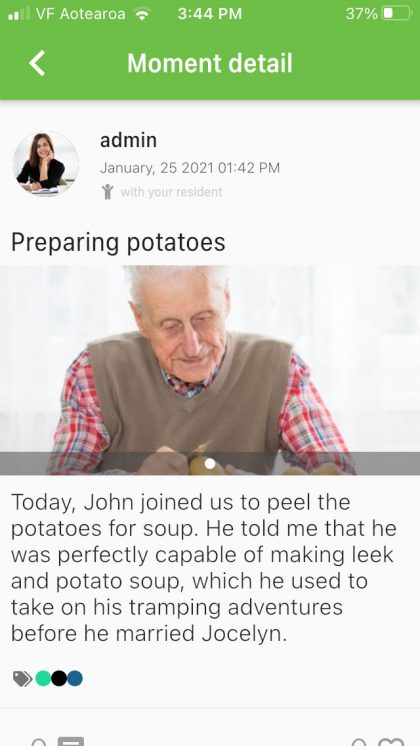
Show you care for older people
Families will always feel more comfortable about the care of an older person when they know that their cherished mum, dad, auntie, uncle, sibling, or friend is happy and being treated with kindness.
Good aged-care providers know this and will support the complete well-being of residents in a way that is appropriate to individual needs, as well as delivering excellent clinical care.
When diversional therapists, healthcare assistants, clinical staff, managers, and owners of aged care homes share time with a resident – that moment needs to be personalised to make a real difference.
For example, chatting with about a resident’s vegetable gardening and their legendary, green-fingered tomato growing expertise is genuinely meaningful.
Demonstrating a sincere interest in their activity and going beyond impersonal small talk is a great way to build a significant relationship with the older person.
At AgedConnect we see activities assistants regularly doing this – because they are astute caregivers who have a holistic approach when caring for older people.
We know they are doing a great job and the leadership team in the residential homes for older people know they are doing a great job, but sometimes the families are not so sure.
How do families know their loved one is happy in residential aged care
When guardians visit a rest home or private hospital it can be difficult to know if the older person is happy and doing OK, especially if their memory is fading.
Every aged-care home will have experienced a resident saying, “I never go anywhere” or “no one ever talks to me” but this may not be quite right.
Developing regular, quality communication with families reassures them that their family member is keeping active and socialising, and it improves the relationship between families and staff.
There are numerous ways this can be done, such as notebooks in residents’ rooms, phone calls, emails, regular newsletters, a news update on a website and social media updates.
The challenge with a notebook is that the family member can only access this when they visit, which is not always feasible if the next-of-kin is busy or lives out of town or overseas.
At times of restricted visitation, such as during Covid-19 lockdowns or during the flu season, families cannot see that notebook full of gems.
Phone calls and emails are essential to foster communication between staff and families, but the activity teams and diversional therapists are less likely to do this as frequently as clinical staff.
It is also difficult to maintain communication logs to maintain contact details with families for compliance requirements and it is not always appropriate for all staff to have family contact details.
Newsletters, website updates and social media posts work for general communication but they are too impersonal for families to know exactly how their loved one is faring.
AgedConnect is a better communication tool for families and residential aged care homes
An innovative solution that gives families frequent, individualized updates about their loved one in assisted living or residential aged care is AgedConnect.
The beauty of this easy-to-use app is that staff can post brief Moments that are just like a Facebook post but they only go to family members and guardians who have permission to access the app.
Privacy and security are always maintained.
Example of a good Moment
When diversional therapists and activity staff share a Moment about an older person’s day, they can communicate the resident’s well-being as well as their professional rapport with a resident.
“Today, John joined us to peel the potatoes for soup. He told me that he was perfectly capable of making leek and potato soup, which he used to take on his tramping adventures before he married Jocelyn.”

This content shows the caregiver knows John’s wife and has discovered something more about his life before he lived in residential aged care.
Add a photo or video, and you have captured and shared a meaningful piece of communication that will put a smile on the faces of family members.
Example of a not so good Moment
“Today the residents helped out peeling potatoes for lunch.”
This content shows the residents were busy but there is no evidence of a connection between staff and residents.
What do families want to know about a person in aged care?
Kindness and compassionate care are some of the most important factors that influence how secure families feel about the well-being of an older person.
The next-of-kin with enduring power of attorney must be informed about clinical changes however, the little updates about daily life give families the feel-good factor about an aged-care provider.
From research we have discovered families want to know the following things about an older person in care:
- Activities with other residents
- Individual one-to-one interactions, maybe in their room
- Trips and outings, both before and after
- Visitors, including who and when
- Socialising between residents
Staff at rest homes, assisted living facilities, private hospitals and dementia care homes always need to protect the residents’ privacy, so it pays ask before sharing a moment and respect residents’ dignity.
To find out more about using AgedConnect to build better communication between aged-care residents, their families and caregiving staff, contact AgedConnect for a free software demo now.

